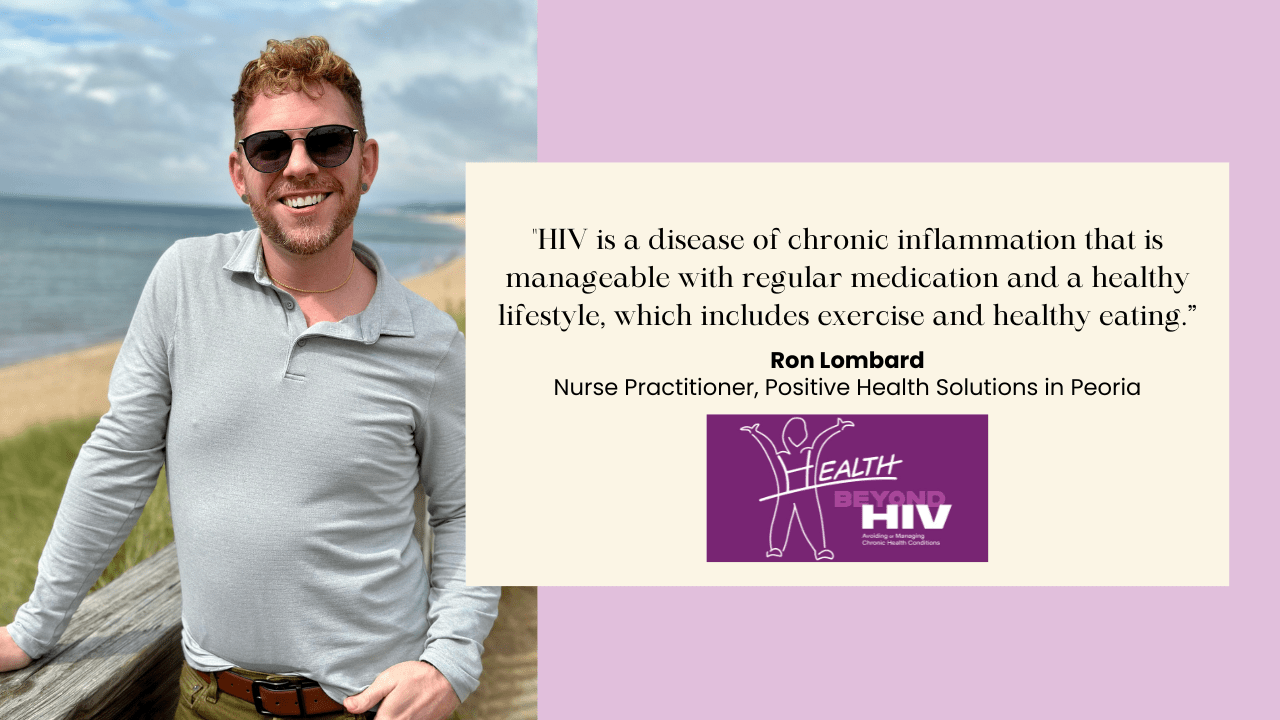Proper nutrition helps people living with HIV improve their quality of life, a philosophy Ron Lombard (he/they) shares with his patients as a nurse practitioner at Positive Health Solutions in Peoria. The clinic at the University of Illinois College of Medicine provides primary medical care for the LGBTQ+ community, including comprehensive medical case management services for persons living with HIV.
“I explain to my patients that HIV is a disease of chronic inflammation that is manageable with regular medication and a healthy lifestyle,” said Lombard. This management includes taking antiretroviral therapy, or ART, precisely as prescribed to suppress HIV to undetectable levels in the blood. These medications also help to reduce HIV-related inflammation, which unchecked can lead to chronic conditions such as diabetes due to insulin resistance, potential fractures with reduced bone density, kidney issues, and certain cancers.
“Being good to your body can help improve the quality of life, make you feel better, and ultimately, motivate you to take positive steps to maintain your health,” said Lombard. He includes regular exercise, especially strength training, as part of healthy living because it helps to build lean muscle mass and bone strength and burn calories simultaneously.
The benefits of healthy eating for PWLH, he said, can include these outcomes:
- Boosted immunity to a higher risk of infections and complications. Proper nutrition can strengthen the immune system and improve resilience against infections.
- Reduced symptoms, such as fatigue and weakness, associated with HIV and an improved daily quality of life.
- Enhanced medication metabolism. A well-nourished body is more efficient at processing medications, resulting in better treatment outcomes and fewer side effects.
Depending on their current health and life status, knowing what and how much to eat is personal for each person living with HIV. Lombard noted that he works with some people who have difficulty getting to the grocery store. He recommends setting realistic goals to gradually include healthier choices in your diet, planning purchases by making a list of preferred foods and meal ideas before grocery shopping, and learning about flavors and cooking techniques that make healthy foods taste good.
Lombard also suggests meeting with a registered dietitian to devise a personal meal plan. The Academy of Nutrition and Dietetics offers guidance in Nutrition Tips to Keep the Immune System Strong for People with HIV AIDS.
“I always explain the cost of healthy foods might be higher, but spending a little more now, if you can, will pay dividends,” Lombard explained. “You’re thinking about life longevity. Trying to eat healthy now helps prevent those complications that are expensive to manage.”
Lombard emphasized the need to follow the local recommendations for boiling tap water or drinking bottled or filtered water to avoid infections when tap water is found to be unsafe. The same guidance to avoid contamination applies when washing cutting boards, fruits and vegetables and practicing hand hygiene.
Learn more about medical care and case management services at Positive Health Solutions.


